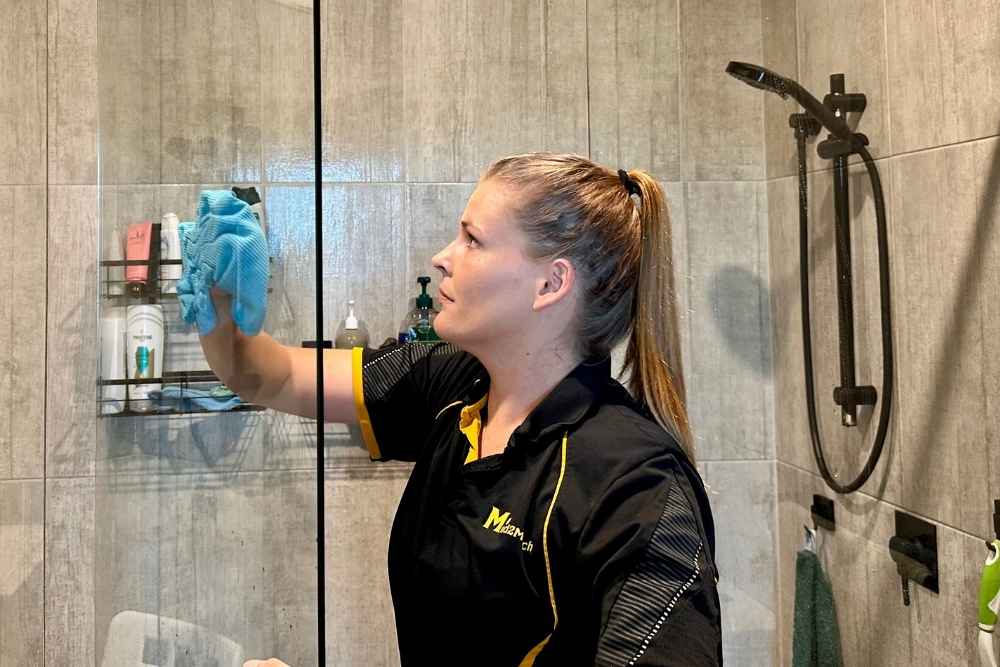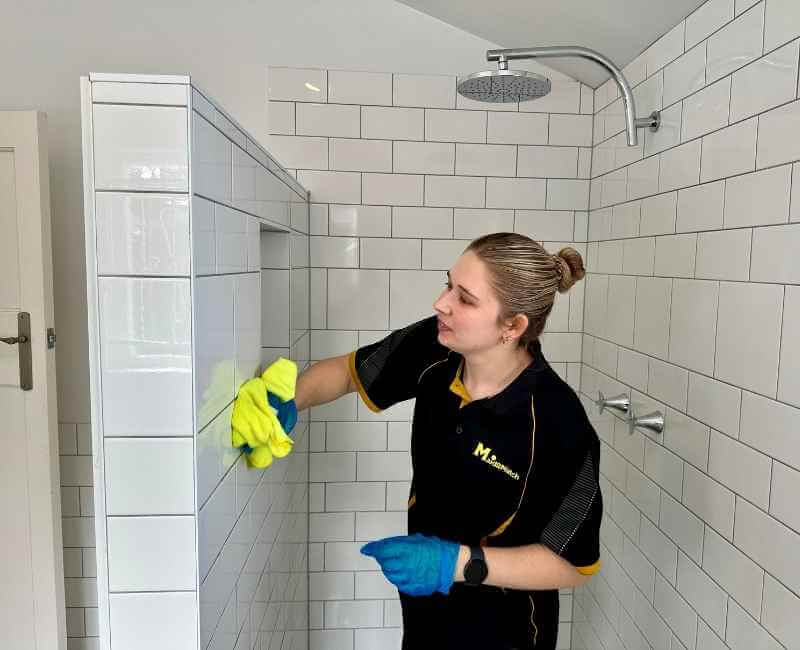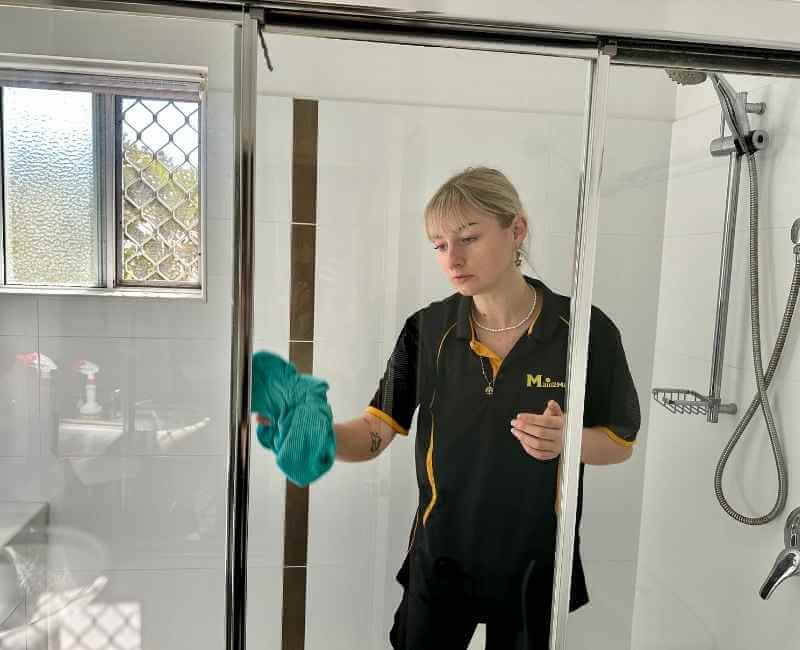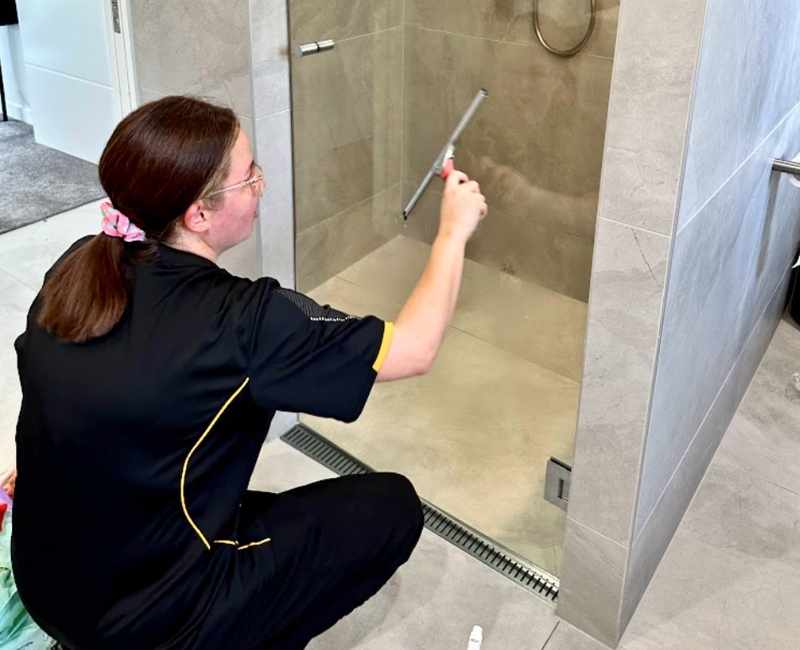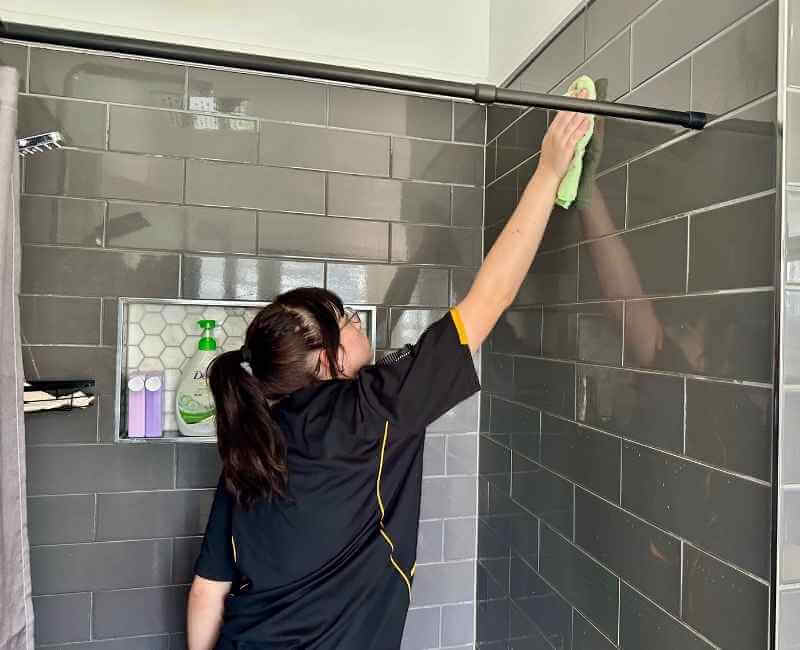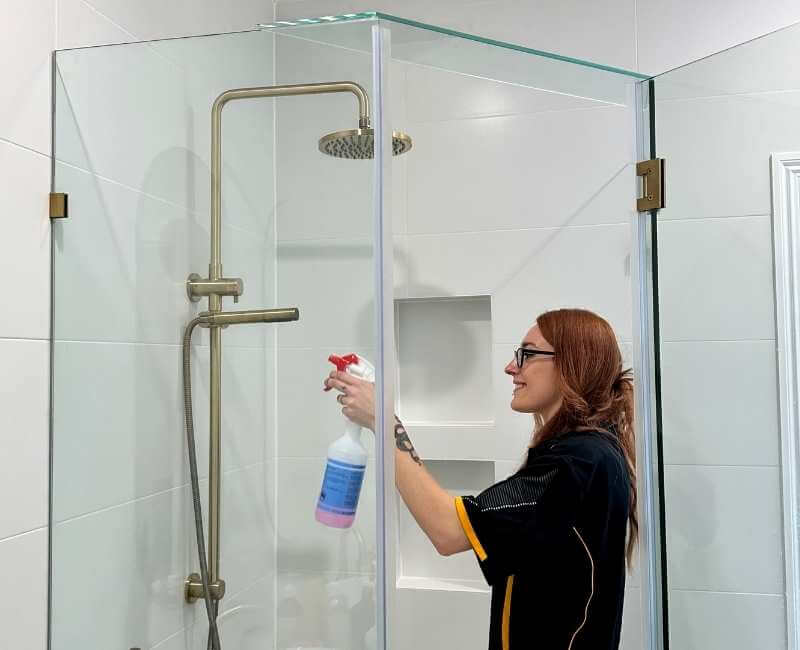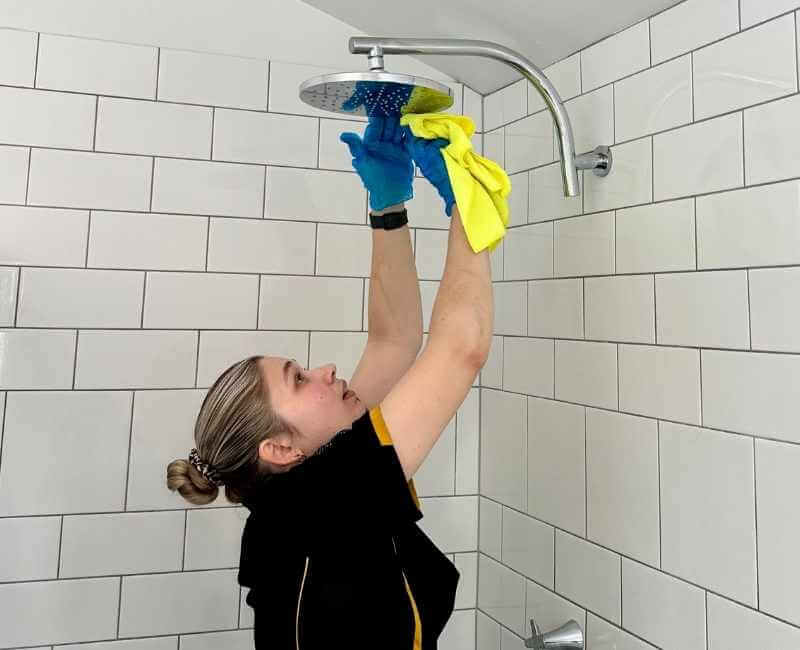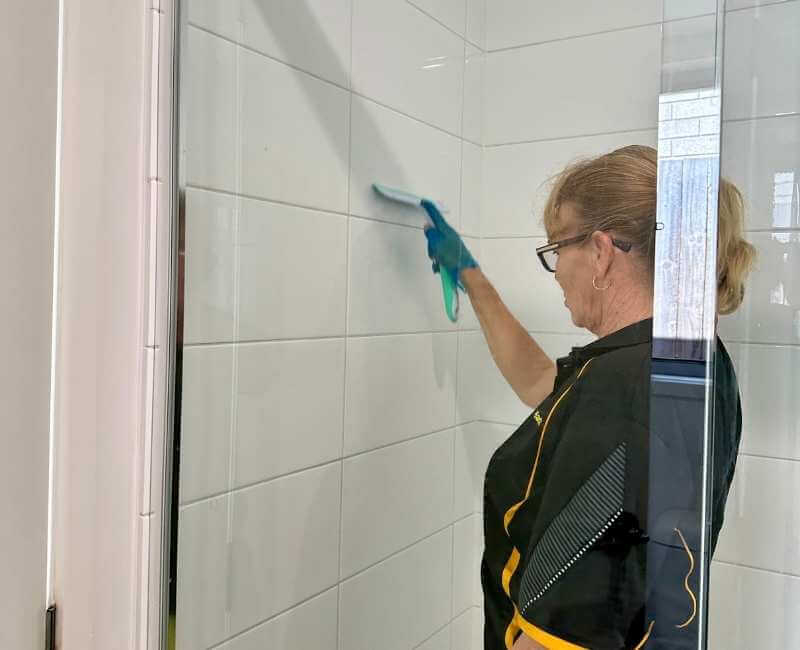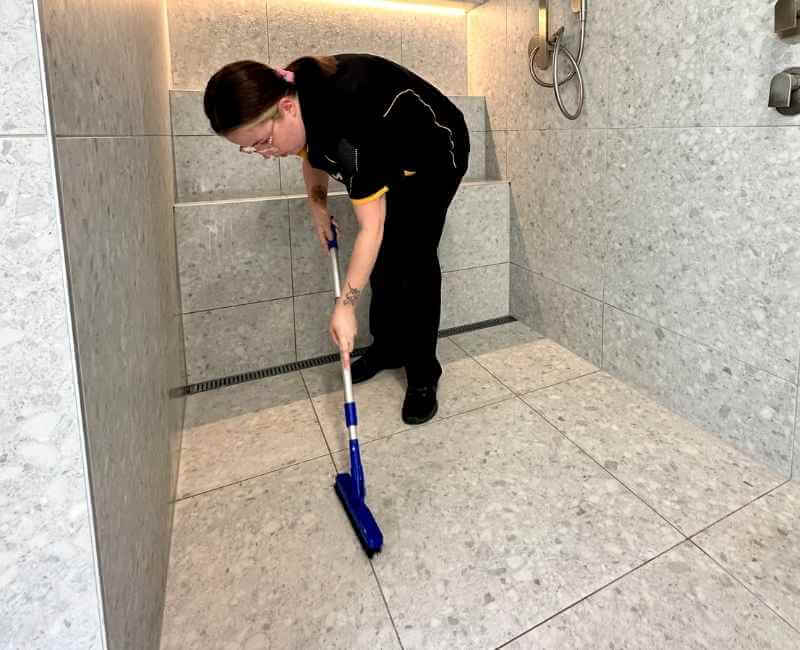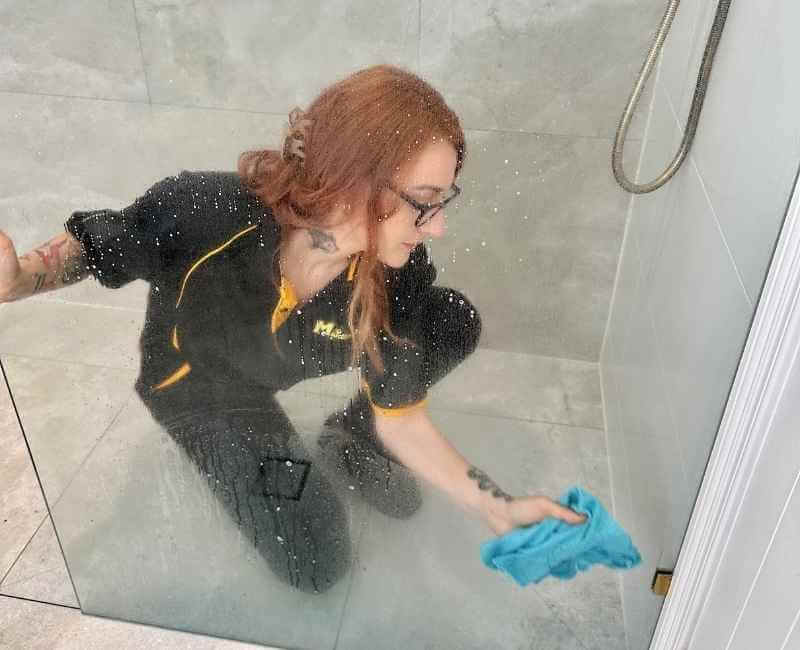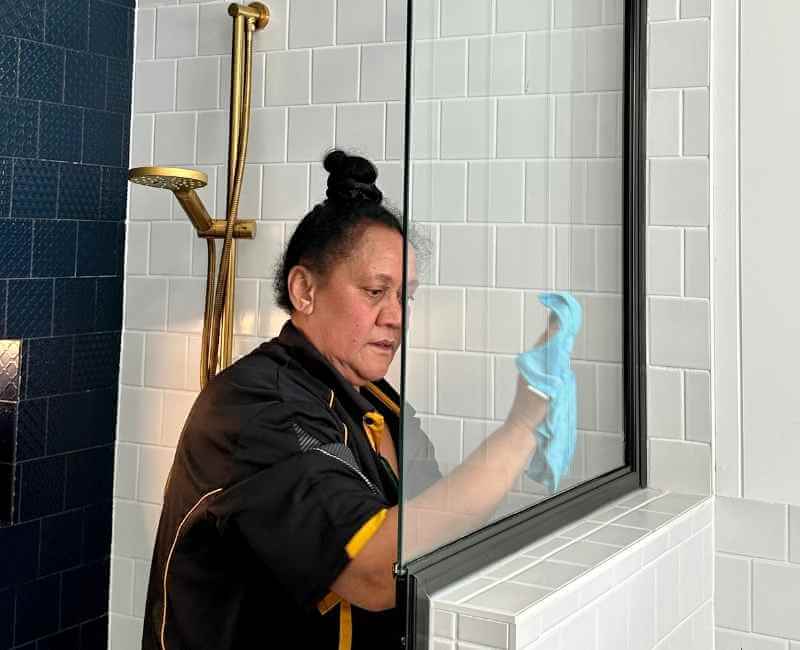Do you squeegee your shower screen and walls after each use? If not, it might be time to start.
Between hard water stains, shampoo suds, and everyday dirt, showers get dirty fast. And the longer you leave the mess, the harder it is to clean.
To keep shower surfaces sparkling, you’ll need to wipe them down daily.
Then, a weekly clean with a vinegar or dish soap solution can also prevent stubborn grime.
In this guide, we’ll tell you how to clean a shower thoroughly and efficiently — like a true Maid2Match pro!
Before Cleaning | Cleaning Different Surfaces | Cleaning Different Shower Parts | Removing Stains | Maintenance Tips
How Often Should You Clean Your Shower?
Clean your shower at least once a week as part of your bathroom maintenance. This helps prevent soap scum buildup, mould, and water marks.
A few daily habits and a deeper clean every month can also keep your shower looking and smelling great.
To make the task easier, follow this shower cleaning routine:
| FREQUENCY | TASKS |
|---|---|
| DAILY (Duration: 1–2 mins) |
|
| WEEKLY (Duration: 30–45 mins) |
|
| MONTHLY (Duration: 1 hour) |
|
Overwhelmed with the list above?
No need to stress — book a professional shower cleaning service! Expert cleaners will leave every surface sparkling, so you don’t have to lift a finger.
Before Cleaning Your Shower
Before you start scrubbing your shower, take a moment to prepare the area and your cleaning supplies.
Clear and ventilate the area
If you’re doing a deep clean, clear the shower first.
Remove bath mats, shower liners, and toiletries like soaps and shampoo bottles so you can clean every surface properly.
You can also run hot water for a few minutes to create steam and loosen tough grime.
After that, open a window or turn on the exhaust fan for ventilation.
Use non-abrasive cleaning tools
When cleaning your shower, do not use stiff brushes or metal scrubbers, as these can scratch surfaces.
Stick to gentler tools instead:
- Soft sponge
- Grout brush
- Old toothbrush
- Microfibre cloth
- Soft-bristle brush
Pick the right cleaning solution
Gentle methods like distilled white vinegar and dish soap are usually all you need for many shower cleaning tasks.
You can also use a specialised shower cleaner. Make sure it’s safe for the surface material, and follow directions carefully.
Never use a toilet cleaner on shower surfaces — it’s far too harsh and best reserved for the toilet.
You should also avoid harsh chemicals like ammonia, bleach, and muriatic acid.
When in doubt, test your method on a small, inconspicuous area first.
If you’re using multiple cleaners, always rinse the first one off completely before applying another. Mixing certain substances can be harmful!
(For example, combining hydrogen peroxide and vinegar creates an irritant called peracetic acid.)
Finally, know what your shower surfaces are made from, so you can choose the right cleaning solution.
How to Clean Different Shower Surfaces
Different shower surfaces can be made from different materials.
It’s worth knowing what you’re working with, so you can clean the shower without causing any damage.
Acrylic or fibreglass shower surfaces
Acrylic (a type of plastic) and fibreglass (a mix of glass and plastic) are commonly used in prefabricated or off-the-shelf shower installations.
These surfaces are durable and non-porous, so they’re generally easy to clean.
For regular maintenance, you can use a commercial shower cleaner that’s safe for plastic materials.
A simple DIY solution also works. Just mix 1:1 white vinegar and warm water. Add a few drops of dish soap for extra stain-fighting power.
Glass shower surfaces
Glass shower doors and screens can make any shower look posh. They’re also more resistant to mould.
However, they easily show stains like soap scum and mineral deposits from hard water.
To keep them clear, always squeegee glass surfaces after you shower.
During your weekly cleans, use a commercial glass cleaner or 1:1 vinegar and water plus a bit of dish soap.
Once you’re done, dry the surface thoroughly with a clean cloth to prevent water spots and streaks.
Tile shower surfaces
Ceramic, porcelain, and glass tiles are among the most common materials used in showers.
For routine cleaning, a simple solution of equal parts white vinegar and water with a little dish soap works well.
You can also use commercial tile cleaners, especially for tough stains.
Stone shower surfaces
While most shower tiles are ceramic or porcelain, some are made from natural (granite or marble) or engineered stone (like quartz).
Mosaic and terrazzo finishes may also contain stone, along with a mix of glass, metal, or shells.
To clean stone surfaces, the safest option is a pH-neutral cleaner for natural stone. A DIY option is warm water with a few drops of gentle dish soap.
Never use anything acidic, like lemon juice and vinegar. Even when diluted, these can etch the stone and leave a permanent mark.
To protect the surface, polish regularly and have a professional apply a stone sealer once a year.
How to Clean Your Entire Shower
Deep cleaning your shower doesn’t just make it look good. It also keeps the space hygienic.
To do the job right, make sure to clean every part of the shower — from walls, to floors, to fixtures.
IMPORTANT: Never mix cleaners — rinse one off completely before using another. And always wear gloves to protect your hands!
How to clean a shower curtain
How often to clean: Monthly
Clean with: Warm water and regular laundry detergent
Shower curtains or liners can become breeding grounds for mould and mildew. Ideally, clean them once a month.
Take the curtain or liner down before tackling the rest of your shower.
Most shower liners can be tossed in the washing machine. Run a gentle cycle with warm water and your regular laundry detergent.
For vinyl liners, add a couple of towels in the wash to help scrub them clean.
Afterwards, hang the shower curtain to dry.
How to clean the shower drain
How often to clean: Weekly
Clean with: Baking soda and hot water
Before cleaning your shower, make sure that water drains freely to prevent any flooding.
Start by removing any visible hair and debris from the shower drain.
Then, take off the drain’s cover (using a screwdriver if needed) and clear any buildup inside. Dispose of the gunk in the trash — do not flush it down the drain!
Next, check for clogs.
If water is draining slowly, pour in some baking soda and wait for 30 minutes. After that, carefully flush the drain with hot water.
Once the drain is clear, you can go ahead and clean the rest of the shower.
When you’re done, return to the drain. Use dish soap and a soft-bristle brush to scrub the cover, strainer, and any other visible parts.
Rinse thoroughly with clean water, and wipe dry.
How to clean a shower head
How often to clean: Weekly
Clean with: Vinegar solution or baking soda
Cleaning your shower head regularly helps prevent limescale and mould buildup.
For chrome or plastic shower heads, soak them in a 1:1 mix of vinegar and warm water with a little dish soap. For other metals, use a thick baking soda paste instead.
If your shower head is fixed, fill a plastic bag with the vinegar solution. Put the shower head inside, and secure it with a rubber band.
Soak for 20–30 minutes, or overnight for heavy buildup. Then, scrub the surface with a soft-bristle brush.
Rinse thoroughly, run the water to flush out any debris, and dry with a microfibre cloth.
For severe buildup, you may need to dismantle the shower head so you can deep clean every part. Check the manual for disassembly instructions!
How to clean shower taps
How often to clean: Weekly
Clean with: Dish soap solution
You can clean shower taps (and other metal fixtures) using dish soap and warm water.
Another option is 1:1 vinegar and warm water. This is safe for many types of metal, including chrome and stainless steel.
Spray the solution onto the tap, and let it sit for about 10–15 minutes.
Gently scrub with an old toothbrush, making sure to get into tiny corners.
Rinse thoroughly to remove soapy residue, then wipe with a soft, dry cloth.
How to clean a shower screen
How often to clean: Daily (routine) and weekly (deep clean)
Clean with: Vinegar or dish soap solution
Shower screens are prone to stains, as they shield the rest of your bathroom from splashes.
To prevent soap buildup and water spots, squeegee the screen after each use.
Every week, clean the shower screen with 1:1 vinegar and warm water plus a little dish soap. Use a mild dish soap solution if the screen is made of stone.
Pour the solution into a spray bottle, and spritz it onto the surface generously. Let it sit for about 15 minutes.
Gently scrub the shower screen with a non-scratch sponge. Use circular motions, and work in sections so you don’t miss a spot.
Rinse the surface with clean water or a damp cloth, then wipe dry with a soft towel.
How to clean shower grout lines
How often to clean: At least once a week
Clean with: Baking soda paste
To clean tile grout, treat stains ASAP, then routinely clean once a week.
Apply a thick baking soda paste onto stains. Wait about 15 minutes, then scrub with a grout brush or an old toothbrush.
If you see orange stains or black marks on shower grout lines, these can be a sign of mould.
Tackle mould with 2 parts baking soda and 1 part 3% hydrogen peroxide (avoid on dark-coloured stone tiles).
Apply the paste onto the stain. Wait for around 15 minutes, then brush gently.
When you’re done, remove any leftover paste with a damp cloth. Finally, wipe the area dry.
How to clean shower walls
How often to clean: Daily (routine) and weekly (deep clean)
Clean with: Vinegar or dish soap solution
Shower walls can be prone to soap scum residue and water stains. To prevent heavy buildup, squeegee the walls after showering.
Once a week, do a more thorough clean. Spray the surface with 1:1 vinegar and warm water with a bit of dish soap.
Use pH-neutral cleaner or diluted dish soap for stone surfaces.
Wait about 10-15 minutes as the vinegar solution breaks down the grime.
Lightly scrub the walls with a soft sponge. Work in sections from top to bottom, focusing on any stained areas.
When you’re done, rinse the walls thoroughly using your shower head or a bucket with water.
Afterwards, squeegee the wall surface, and wipe dry for a sparkling clean finish.
How to clean shower floors
How often to clean: Weekly
Clean with: Vinegar or dish soap solution
You can clean most shower floors with a 1:1 vinegar and warm water, plus a bit of dish soap.
(For natural stone floors, use a specialised cleaner or diluted dish soap.)
Spray the cleaner generously over the floor, and let it sit for 10–15 minutes to break down the buildup.
Then, scrub the surface using a soft-bristle brush. Pay extra attention to very dirty spots.
When you’re done, rinse the floor with the shower head or a bucket with clean water.
Squeegee the excess water towards the drain, and mop up any remaining moisture with a clean rag.
How to clean a bathtub
How often to clean: Weekly
Clean with: Vinegar or dish soap solution
Some showers are built over a bathtub (aka a shower over bath). To clean the bathtub, consider what it’s made of.
A 1:1 vinegar and warm water mixture is suitable for most finishes. If it’s a stone bathtub, use diluted dish soap or a dedicated natural stone cleaner.
Spray the bathtub surface with the right cleaning solution, and let it sit for 10-15 minutes.
Gently scrub with a soft cloth or sponge. For hard-to-reach spots, use an old toothbrush.
Rinse off any vinegar or soap residue with your shower head or a damp cloth, then wipe everything dry.
Removing Stubborn Stains from Shower Surfaces
Showers can develop many stains — from hard water spots to rust!
Treat them as soon as they appear to keep them from setting and becoming harder to remove.
Always test any cleaning product on a small, hidden area first to make sure it’s safe for the surface.
Mould
Mould can appear as black, orange, or pink stains in the shower.
To kill it, spray undiluted white vinegar directly on the affected area. Let it sit for 1 hour.
You can also use 3% hydrogen peroxide. Apply it onto the stain, and leave it for 10–15 minutes.
Scrub the mouldy area if needed, then wipe with a clean, damp cloth.
Limescale
Limescale is a hard, chalky buildup caused by mineral deposits in hard water.
To remove it, warm white vinegar works wonders. Just be warned: the smell can be a bit strong!
Wear gloves to protect your skin, then boil some vinegar and let it cool slightly.
Dip some paper towels into the vinegar, and stick them onto the affected areas.
Leave them for 30–60 minutes to let the acid break down the limescale.
Afterwards, remove the towels and wipe the surface with a damp cloth.
If stains remain, dip a damp sponge in a little baking soda. Gently scrub the marks until they lift.
Rinse clean any residue with a damp cloth, and dry the area thoroughly.
Rust stains
Shower fixtures and tiles are prone to rust due to constant water exposure. Hard water with high iron content can also leave behind rust stains.
To remove rust stains on tiles and other fixtures, apply a baking soda paste onto the area. This works especially well for newer marks. Wait 15 minutes, then gently scrub with a damp sponge.
For older rust stains, use cleaning vinegar, which has a higher acidity (typically 6% or more) than regular white vinegar.
Spray it directly onto the stain, and let it sit for 10–15 minutes. Scrub the area with a soft sponge, then wipe with a damp cloth.
If the stain persists, use a commercial rust remover that’s safe for the surface material. Always follow the product instructions carefully!
Soap scum
To remove soap scum from shower surfaces, use 3% hydrogen peroxide.
Spritz the solution directly onto the affected area, and let it sit for 15 minutes. Scrub gently with a soft sponge or an old toothbrush.
Afterwards, rinse the surface with the shower head or a damp cloth to remove any peroxide residue.
Tips to Keep Your Shower Clean
One of the best ways to keep your shower clean is to wipe down or squeegee surfaces after each use. That includes glass doors, screens, walls, and the floor.
You can also use a no-scrub daily shower cleaner, like this product from Astonish. Be sure to check if it’s safe for the surface.
Also, let the exhaust fan run for at least 15 minutes after each shower. This helps reduce humidity and prevent mould.
As part of your weekly routine, don’t forget to clean other shower accessories, too.
Wash bath mats, rugs, and towels, as they can trap moisture and harbour bacteria.
These simple habits can help keep your shower fresh and sparkling every day!
FAQs: More Hacks for a Sparkling Shower
Ready to transform your grimy shower? These Q&As cover everything you need to know!
What is the best thing to clean a shower with?
The best shower cleaner depends on the surface, material, and type of stain you’re dealing with.
For regular cleaning, a 1:1 vinegar and water solution with a little dish soap is usually enough.
However, vinegar can damage natural stone and some metals. On these surfaces, use diluted dish soap or a specialised cleaner.
What is the best way to clean the inside of a shower?
To clean the inside of a shower, start by removing all items from the area.
Pick up hair and debris from the drain. Then, spray the screen, walls, and floor with the appropriate cleaning solution.
Let it sit for 10–15 minutes, then scrub with a soft sponge. When you’re done, rinse the surfaces thoroughly and dry with a towel.
What is the fastest way to deep clean a shower?
Unfortunately, there’s no shortcut to cleaning a dirty shower.
However, you can extend the time between deep cleans by:
- Using a squeegee on surfaces after every shower
- Spot treating stains as soon as they show up
- Staying consistent with your weekly cleaning
How do I remove heavy grime from my shower?
To remove heavy grime from your shower, use any of the following:
- Undiluted white vinegar
- Specialised shower cleaner
- 2:1 baking soda and 3% hydrogen peroxide
Always do a spot test and read any product label to make sure it’s safe for the surface you’re cleaning.

